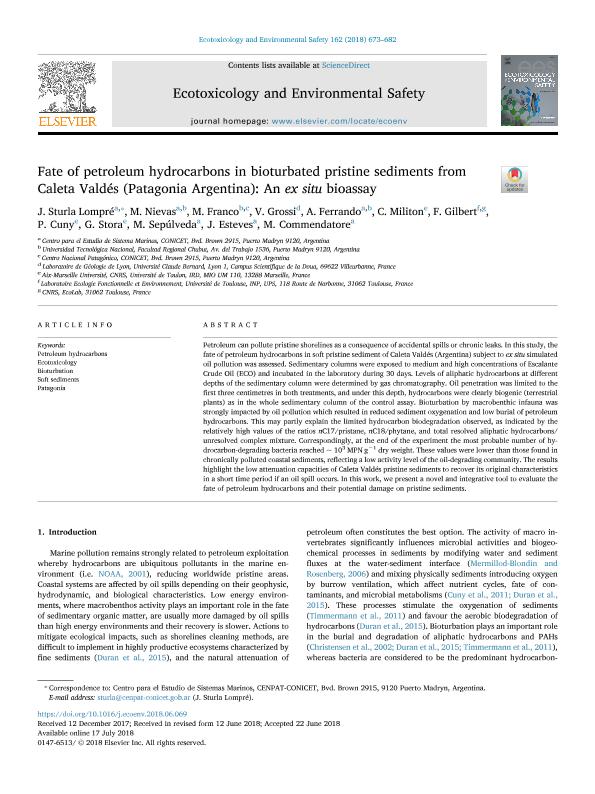Artículo
Fate of petroleum hydrocarbons in bioturbated pristine sediments from Caleta Valdés (Patagonia Argentina): An ex situ bioassay
Sturla Lompre, Julieta ; Nievas El Makte, Marina Lucrecia
; Nievas El Makte, Marina Lucrecia ; Franco, M.; Grossi, V.; Ferrando, Agustina
; Franco, M.; Grossi, V.; Ferrando, Agustina ; Militon, C.; Gilbert, F.; Cuny, P.; Stora, G.; Sepúlveda, Marcela Andrea
; Militon, C.; Gilbert, F.; Cuny, P.; Stora, G.; Sepúlveda, Marcela Andrea ; Esteves, Jose Luis
; Esteves, Jose Luis ; Commendatore, Marta Graciela
; Commendatore, Marta Graciela
 ; Nievas El Makte, Marina Lucrecia
; Nievas El Makte, Marina Lucrecia ; Franco, M.; Grossi, V.; Ferrando, Agustina
; Franco, M.; Grossi, V.; Ferrando, Agustina ; Militon, C.; Gilbert, F.; Cuny, P.; Stora, G.; Sepúlveda, Marcela Andrea
; Militon, C.; Gilbert, F.; Cuny, P.; Stora, G.; Sepúlveda, Marcela Andrea ; Esteves, Jose Luis
; Esteves, Jose Luis ; Commendatore, Marta Graciela
; Commendatore, Marta Graciela
Fecha de publicación:
10/2018
Editorial:
Academic Press Inc Elsevier Science
Revista:
Ecotoxicology and Environmental Safety
ISSN:
0147-6513
Idioma:
Inglés
Tipo de recurso:
Artículo publicado
Clasificación temática:
Resumen
Petroleum can pollute pristine shorelines as a consequence of accidental spills or chronic leaks. In this study, the fate of petroleum hydrocarbons in soft pristine sediment of Caleta Valdés (Argentina) subject to ex situ simulated oil pollution was assessed. Sedimentary columns were exposed to medium and high concentrations of Escalante Crude Oil (ECO) and incubated in the laboratory during 30 days. Levels of aliphatic hydrocarbons at different depths of the sedimentary column were determined by gas chromatography. Oil penetration was limited to the first three centimetres in both treatments, and under this depth, hydrocarbons were clearly biogenic (terrestrial plants) as in the whole sedimentary column of the control assay. Bioturbation by macrobenthic infauna was strongly impacted by oil pollution which resulted in reduced sediment oxygenation and low burial of petroleum hydrocarbons. This may partly explain the limited hydrocarbon biodegradation observed, as indicated by the relatively high values of the ratios nC17/pristane, nC18/phytane, and total resolved aliphatic hydrocarbons/unresolved complex mixture. Correspondingly, at the end of the experiment the most probable number of hydrocarbon-degrading bacteria reached ~ 103 MPN g−1 dry weight. These values were lower than those found in chronically polluted coastal sediments, reflecting a low activity level of the oil-degrading community. The results highlight the low attenuation capacities of Caleta Valdés pristine sediments to recover its original characteristics in a short time period if an oil spill occurs. In this work, we present a novel and integrative tool to evaluate the fate of petroleum hydrocarbons and their potential damage on pristine sediments.
Palabras clave:
BIOTURBATION
,
ECOTOXICOLOGY
,
PATAGONIA
,
PETROLEUM HYDROCARBONS
,
SOFT SEDIMENTS
Archivos asociados
Licencia
Identificadores
Colecciones
Articulos(CESIMAR)
Articulos de CENTRO PARA EL ESTUDIO DE SISTEMAS MARINOS
Articulos de CENTRO PARA EL ESTUDIO DE SISTEMAS MARINOS
Citación
Sturla Lompre, Julieta; Nievas El Makte, Marina Lucrecia; Franco, M.; Grossi, V.; Ferrando, Agustina; et al.; Fate of petroleum hydrocarbons in bioturbated pristine sediments from Caleta Valdés (Patagonia Argentina): An ex situ bioassay; Academic Press Inc Elsevier Science; Ecotoxicology and Environmental Safety; 162; 10-2018; 673-682
Compartir
Altmétricas



